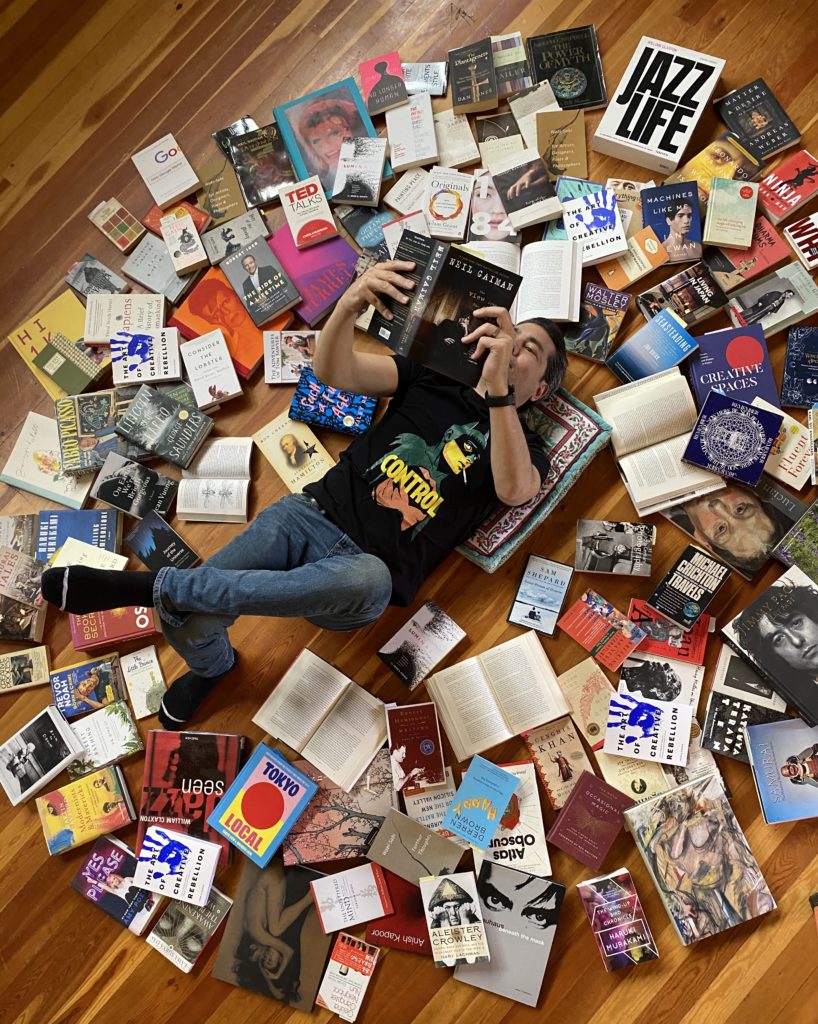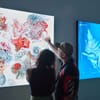Designer and artist John S. Couch is one of today’s leading creative minds. He knows from experience how difficult it can be to balance conformity and creative integrity in the corporate world. In his book “The Art of Creative Rebellion: How to champion creativity, change culture and save your soul,” he shares insights that help free-spirits to foster their artistic potential and navigate a fulfilling work life.
John started his design career at Wired Magazine, where he helped launch Wired Japan. Later he moved to Los Angeles and took on leadership roles at The Museum of Contemporary Art (MOCA), CBS and eBay. Today he is Vice President, Product Design for on-demand video service Hulu.
In our interview, John talks about how he balances a creative life and a corporate career, what leadership skills are relevant in the future, why intuition and contemplation are crucial to succeeding as a creative, and how to work through the comparison issue by being radically yourself.
The title of your latest book is called “The Art of Creative Rebellion.” Why do you consider creative rebellion an art in itself?
John S. Couch: All human beings are creative by nature and strive for a creative life. As children, we dance, sing, draw, and express ourselves freely without being concerned about the outcome. It’s all about enjoying the creative process and being in the moment. As we get older, we lose that joy because we focus too much on the result itself and compare ourselves to other people. Maybe our parents or teachers even said things like: “You can’t make a living doing that” or “You’re not very good at this.” And our expansive creative spirit then gets diminished by the pressure of society. We are suddenly creating for the admiration of other people. By the time we get into college, we have become very practical. Some people manage to keep the creative flame alive until their late twenties, but then they get their first job and build a family, and the societal pressure rises. Creative rebellion is the art of not neglecting the urge to express ourselves creatively. It’s allowing us to do the things we loved as children. And there is a way that we can work in our job, contribute to society, and spend time with family and friends without feeling guilty that we use some time of the day to foster living a creative life.
What characteristics does a creative rebel need to balance that level of conformity and creative integrity as an adult?
Conformity is a very human and tribal experience. We are social animals, and we want to belong because it ensures our survival within society. If we don’t stay in our lane and stick to our responsibilities, we can get excluded and might lose our jobs. Our place in society is also predicated by the country we were born in, our gender, and religion. We inherit so many stories right from the beginning. Creative rebels, at one point, start to question given conventions and circumstances and examine them based on their principles and values. A considerable part of questioning is contemplation, which then leads to a creative life. Usually, we don’t have time to contemplate because our minds are distracted with so many other things. It took a pandemic like COVID-19 to make us pause and get off that treadmill for a moment. In my book, I use the analogy that our mind is like a glass of stirred up dirt-water. As soon as it stands still, the sediment will gather at the base, and the water will turn clear.
The lockdown has brought a similar effect. We suddenly had time to contemplate and think about our purpose in life. The pandemic has brought death much closer to us, and I believe if we look at mortality the right way, it can become inspiring because it makes us realize that a creative life is an incredible gift and that we only have a limited amount of time.
In your book, you write: “Art is abstract, conceptual and asks a question. Design is particular and utilitarian and answers questions.” How do you think the design industry will respond to the pandemic?
The economic crisis of 2008 was the birthplace of Uber, Airbnb, and Pinterest. Many new innovative industries were emerging because there was this tremendous amount of pressure, and in that tense environment, things either break, or start to galvanize and become a diamond. I think we are in a similar situation right now, and designers within all disciplines can see this as an opportunity to innovate. Industrial designers might think about developing easier or more efficient ways to produce masks and respirators using 3D-printing. Instructional designers can find smart psychological concepts to allow people to move within spaces without touching anything. These solutions are essential, but they are also very tactical. I believe there is a need to develop answers for deeper core human issues, for instance, how we design companies and the work-life of the future. With the rise of AI, many middle-class jobs will eventually be taken over by computers, and a universal basic income seems economically plausible.
One of the things AI can’t do so far is to compete with human beings on imagination and creativity. So if we look at it the right way, and now I’m being macroscopic, it could lead to a new renaissance. The original renaissance happened after the Dark Ages when the world stopped warring for a moment. It was the ideal ground for the arts to prosper. The Medici family supported Michaelangelo, and Leonardo da Vinci and the creative arts and science were blooming. Could it be possible in a post-COVID reality that we start thinking about what a new Renaissance could look like in terms of scientific thinking, design, and art? I feel now would be the right moment to build that foundation because we are all more open to change, especially the young generation.

Check out John’s blog to learn more about living a creative life and order his latest book The Art of Creative Rebellion.
You mentioned designing new businesses and a new work life. How do you think future leaders will do business compared to today?
I think the leaders and CEO’s of the future will build companies that are purpose-driven and don’t solely focus on profitability. There will be a rise in social and environmentally conscious entrepreneurship that harmonizes purpose and profitability without destroying the planet. The company culture itself will become more tolerant, diverse, and inclusive. A healthy culture is not only good for human beings; it’s also crucial for the company itself because the employees are going to be more innovative and creative in an inclusive environment that fosters a creative life.
When it comes to leadership, what are the most common mistakes inexperienced leaders make, and how can they avoid them?
If we look at the animal habitat, there is an alpha that forms a structure that helps the tribe to survive. Humans are no different. We are trained by corporate society to have a pyramid structure with a boss at the top. But from my experience, I always had the best leadership successes when I flattened out the environment. Then it becomes more of a radical candor between my team members and myself. And I can still be respected in my role as a leader, but I earn that trust through showing the team that I have their best interests in mind and don’t make decisions based on my ego. Another mistake is to try to control and micromanage everything. Then you get a fear-based environment, and that’s not only unhealthy for the employee, but it also paralyzes creativity and, therefore, innovation because no one dares to do anything that might get them into trouble.
What are the most essential skills that a creative leader will need in the future?
Every form of communication is crucial in leadership, which also includes nonverbal. I once had a boss who would put his feet up on the conference table, sometimes with the hands behind his head, a power move that sends a signal like: “Look at me, I’m so dominant and relaxed I can lord it over to you peons.” An environment like this causes fear and resentment. That’s why I think empathy is an essential skill in leadership. When someone is working with me, I don’t take this lightly. Yes, the employees earn money, but they are trading the most valuable thing in their life, which is time. When I look at a team member, I don’t only see a designer; people are so much more than their job titles. If I manage to establish a safe workplace where employees can open up about themselves without fearing that it could be considered a weakness, then I create a healthy foundation for creativity and creative life.
Within the creative industries, there is still a lot of potential for improvement when it comes to allowing vulnerability. What might be the reason for that?
I think a lot of it has to do with competition. It’s survival of the fittest. We feel we have to be better than the person next to us, but if we are honest with ourselves, we know that this is ludicrous because there is no way to be the best. Billions of people were born and died before us, and there will be trillions after us, and we are only here for this brief moment — all we can do is do our best. The competition of what quality is at your work should not be with the person next to you. Quality should be your standard. But to figure out what your norm of quality is, you have to reduce the noise. And that again has to do with contemplation. If we are only looking at our work compared to other people, we will never know if we are any good. If we are not genuinely connected to the creative source, then our work will always be weak. It will always be a reflection of something else, but it won’t be us. To be a great creator, we have to be radically ourselves. Then even if we are mediocre, we are still better than most of our competition. Great artists like David Bowie or Jim Jarmusch who master living a creative life made their way because they managed to work through the comparison issue.
What advice can you give leaders right now to keep their teams motivated in these times of uncertainty?
Try to cultivate a work environment in which change is not considered the enemy but a stimulus for creativity. The first reaction to change is usually shock and fear. That fear often turns to anger because we are now annoyed by what has happened. That anger can later lead to a state of despair and depression. We feel powerless, and our energy just drains out. The other way to look at the anger of change is that we can do something about it. Great future leaders will be able to bring their team from a state of despair to a state of excitement. I have a philosophy that I call “Zen-Stoicism,” something that I made up for myself. Zen refers to Japanese Zen Buddhism culture and Stoicism to Greek and Roman culture. Stoicism means to fully accept the reality as what it is and not to resist or deny it. Then the Zen part comes into play, which allows contemplation, unlocks creativity, and ultimately solves a problem.
I think we can all learn about leadership. There are certain personality types who, just by the pure force of will or often extreme narcissism and ego, can get to positions of power. I think that’s an old model that goes back to kings and queens. Leaders of the future should be highly inspiring and empowering. They should make us feel better about ourselves after leaving a meeting with them, the ones who make us think that we can do anything.
In your book, you also mention intuition is crucial to becoming a great creative. Why is intuition so important, and how can we learn to foster it?
Intuition is often mistrusted in many business environments because there is so much reliance on data and research. And of course, you need to have that information too, but what we often miss is intuition that comes from trusting ourselves. Throughout our lives, we are making experiences that reach our subconscious. It first goes into our brain, then our heart, and ultimately in our gut. It moves from information to knowledge to wisdom. And I believe our intuition is primarily our wisdom coming out, which is very difficult to measure. That’s why people don’t trust it. They feel that it’s not quantifiable. A very famous example of intuition we all know is the iPhone. When it first came out ten years ago, everybody was on a Blackberry and used to its keyboard. Many people made fun of the flat surface of the glass and said nobody would use it. Even the research data showed the same thing. It took Jony Ive, Steve Jobs, and Tony Fadell to push through with this idea. Intuition is incredibly crucial for a creative. You can foster it through awareness, by being open to the extraordinary and calling out mediocrity for what it is.
Creatives often face the challenge of convincing a client, a team member, or a CEO of an idea. Do you have tips on how to sell it successfully?
Speak the language of a CEO and present creativity and design in a way they can understand it. Because often, designers and creative people are a bit of a mystery within a corporation. A lot of people in high-level positions have gotten excellent in working within the system. Creative people, in general, tend to work outside the system. We have to learn to use words of inclusiveness when presenting our idea. We need empathy for the senior executive and help bring him or her along. This is when storytelling comes in. Probably the most powerful thing I would recommend to anybody whether they are a designer, artist, or musician, is to learn how to tell a story about why they are doing what they are doing.
It requires a strong personality to push an idea through because often we have to face a significant amount of resistance from our team members, clients, bosses, or CEOs calling us down. This moment is the most isolating experience because we could lose our job and reputation. We are not even sure anymore if we are crazy or visionary. I’m sure Elon Musk must go through this all the time. And then, hopefully, our idea starts to succeed, and all the people who have stopped us before will suddenly come rushing over to our side. We have to be very clear in what we believe and also, which is much harder, we have to take the risk to get fired if it doesn’t work.
Most of us don’t dare to take these risks because we are terrified of instability and the unknown. But if we want to do anything extraordinary in life, we will have these moments in which we fail spectacularly. We should get into a habit of failing a lot. Because if we do that, we realize we can survive it. And the more we fail, the more we have a chance of succeeding in the long run. It’s about constantly leaving our comfort zones. In my book, I use a quote by David Bowie that fits very well: “If you feel safe in the area you’re working in, you’re not working in the right area. Always go a little further into the water than you feel you’re capable of being in. Go a little bit out of your depth. And when you don’t feel that your feet are quite touching the bottom, you’re just about in the right place to do something exciting.”
This interview has been edited for length and clarity.
Interview by Eva Bolhoefer





